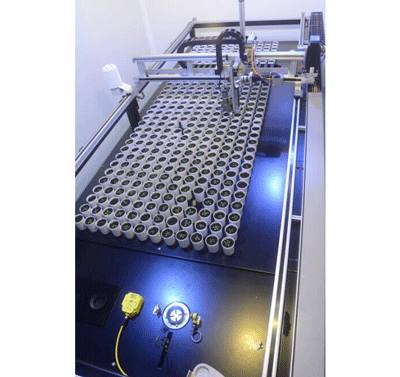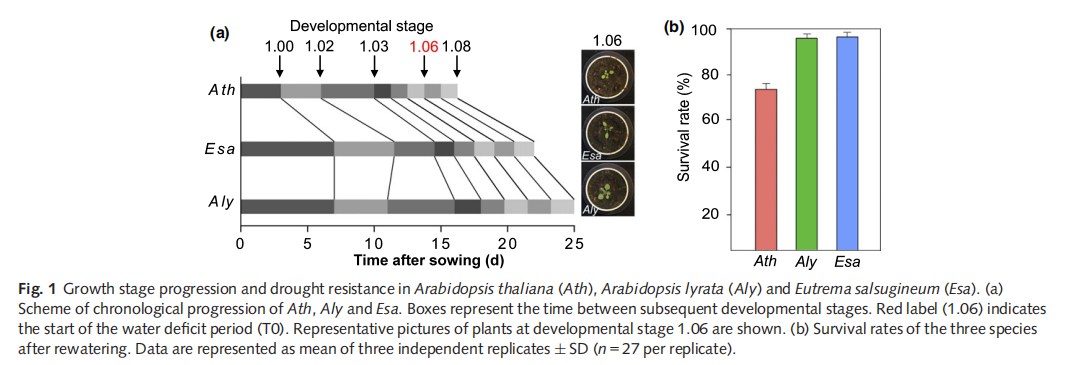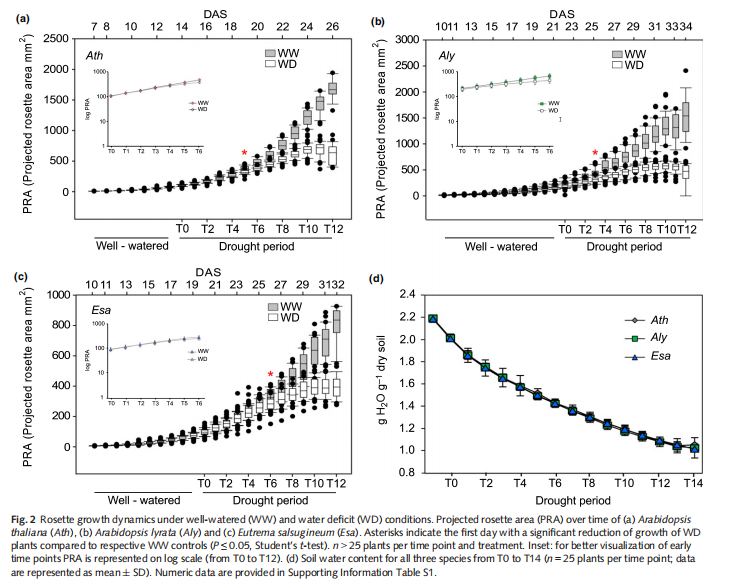近,來自比利時根特大學的專家利用WIWAM XY植物表型系統發表了題為Drought resistance is mediated by divergent strategies in closely related Brassicaceae的文章,發表在植物學期刊New Phytologist上。
將大規模自動化理念和工業級零件和設備整合入植物成像系統的廠家,SMO公司在植物表型成像分析領域處于的技術前列,大面積葉綠素熒光成像系統使WIWAM成為植物表型分析與功能成像領域為*儀器設備,植物生長、脅迫響應等測量參數達幾百個。工業級部件品質使系統非常耐用,基本免維護,與同類產品相比,特點突出。目前WIWAM植物表型平臺分為WIWAM XY,WIWAM Line以及WIWAM Conveyor 3個系列。野外移動版稱為WIWAM Screening。
WIWAM XY是一款高通量可重復性表型機器人,用于對小型植物, 如擬南芥植物的研究。該機器人可定期對多種植物參數進行自動化灌溉和并測量多種植物生長參數。WIWAM XY代替了很多手工處理,省時省錢,精度*。

WIWAM XY由花盆定位桌面, 不同個體線路, 上方機器臂以及1或多個成像或稱重/澆水站組成。全套系統可以安裝在現有生長室,內置高品質工業部件,可按用戶要求進行定制。
植物在各自花盆內生長, 預設時間間隔,機器臂提取植物, 將其帶到成像和稱重澆水工作站。機器臂按照程序設定移動到花盆上方,并將其提升脫離桌面。設備可配RFID讀取裝置以及花盆可貼上FID 標簽,可作為額外花盆識別法 ,識別和校正桌面上因手工花盆安置造成的錯誤。通常旁邊取景照相機從不同角度獲得圖像。成像站可安裝一系列照相機系統。組合稱重/澆水站集成在機器臂上。花盆中植物在澆水時旋轉以獲得水分布 。灌溉精度*可達 +/- 0.1 mL。另外,灌溉可基于自動目標重量計算或固定量。在整個實驗過程中,可控制土壤濕度水準 。集成光,溫度和濕度傳感器可監控溫度,詳細記錄實驗生長條件。
植物表型機器人WIWAM XY產品特點
1、澆水時花盆旋轉以獲得水分布
2、高精度灌溉(達0.1mL !).
3、WIWAM XY 可配置環境傳感器
4、WIWAM XY 配有直觀用戶界面
5、開放式數據庫結構
6、可提供全定制系統、花盆數量可擴展
7、高環境適應性、耐受苛刻的調節后環境
圖像分析和數據可視化
WIWAM XY有VIB開發的圖像分析和數據可視化軟件支持此軟件包,稱為 PIPPA,是中央網絡界面和數據庫,一方面用來為不同類型的WIWAM植物表型平臺提供管理的工具,另一方面用于分析圖像和數據 。
PIPPA 與該平臺通訊,通過將PIPPA網絡界面生成的實驗結果傳到平臺。每個花盆的處理和基因型信息已在數據庫限定以確保在整個實驗中的數據一體性。實驗期間,,PIPPA 對來自平臺的稱重,灌溉測量,環境數據,錯誤記錄以及圖像信息進行處理分析。PIPPA支持這些圖像后續處理 (旋轉/收獲/等) 。圖像分析文本可以在PIPPA 界面初始化, 可設置于網絡服務器運行 (獨立版本) 或計算機群運行,以快速生成結果。 隨后,通過檢查數據是否在特定閾值之內可在網絡幾面對輸出文本進行驗證,例如,是否生長相關性狀,如植物枝條面積一段時間內是否增加。
平臺收集的環境和稱重/澆水數據以及圖像處理數據在PIPPA 顯示,圖表生成組件生成圖表,支持幾種類型圖表,可聚焦以及輸出文檔。數據也可從文件導入PIPPA 或從PIPPA 數據庫導出數據到文檔,將應用范圍大化。另外,因可直接獲得所有圖像數據, 你也可通過喜歡的分析文本輕松處理圖像。
IT 解決方案和儲存
WIWAM 軟件在工業計算機上運行,觸摸屏 。該軟件配有用戶友好圖形界面, 用于控制機器人站行為以及以*靈活度設計設計實驗 。可同時運行多組實驗,可運行不同隨機模式 ,可及時規劃單個植株或一組植株的處理。 在預設啟動時間,PC機將向工業PLC 發送指令, 照管機器人移動 。所有成像,稱重/澆水以及環境數據均可存于SQL數據庫,記錄后可用于分析記錄 。系統采用了開放式數據庫結構,可以直接獲取圖像。該平臺可以與高性能計算相連,用于分析儲存數據或者可與本地服務器設施整合。
SMS 郵件服務可以通知用戶機器報警和錯誤,可盡快進行用戶干涉。系統可于任一點暫停和停下,UPS (不間斷電源)可防止數據丟失和確保在停電后全系統恢復。該軟件也有平臺管理員系統設置和維護行為通道。
Drought resistance is mediated by divergent strategies in closely related Brassicaceae
Summary
Droughts cause severe crop losses worldwide and climate change is projected to increase their prevalence in the future. Similar to the situation for many crops, the reference plant Arabidopsis thaliana (Ath) is considered drought-sensitive, whereas, as we demonstrate, its close relatives Arabidopsis lyrata (Aly) and Eutrema salsugineum (Esa) are drought-resistant.

To understand the molecular basis for this plasticity we conducted a deep phenotypic, biochemical and transcriptomic comparison using developmentally matched plants.
We demonstrate that Aly responds most sensitively to decreasing water availability with early growth reduction, metabolic adaptations and signaling network rewiring. By contrast,Esa is in a constantly prepared mode as evidenced by high basal proline levels, ABA signaling transcripts and late growth responses. The stress-sensitive Ath responds later than Aly and earlier than Esa, although its responses tend to be more extreme. All species detect water scarcity with similar sensitivity; response differences are encoded in downstream signaling and esponse networks. Moreover, several signaling genes expressed at higher basal levels in both
Aly and Esa have been shown to increase water-use efficiency and drought resistance when overexpressed in Ath.
Our data demonstrate contrasting strategies of closely related Brassicaceae to achieve drought resistance
Plant growth conditions and drought treatment
The plant phenotyping platform (WIWAM xy) at VIB Ghentwas used for high-throughput phenotypic characterization. Pots were prepared as described (Skirycz et al.,2011b). Briefly, all pots (128 per species) were radio frequencyidentification (RFID)-tagged and the dry soil weight of individual pots was calculated. Three to four plants were sown after 4 d of stratification at 4°C in the dark. Pots were placed on WIWAM xy and covered with plastic film for 3 d to maintain humidity. On day 4 the cover was removed and the well-wateredcondition (WW) of 2.19 g water g1 soil was maintained robotically. When two complete open cotyledons were observed in allpots, one average-sized seedling per pot was kept. Daily, images of the plants were taken, each pot was weighted, positions were randomized and water was added to precisely maintain WW conditions.
Water deficit (WD) treatment started when leaf 6 (L6) was initiated on the apex (1 mm, developmental stage 1.06) as judged by manual inspection (Boyes et al., 2001). Watering for the WD group (78 pots per species) was stopped at 14 (Ath), 20 (Esa) and 22 (Aly) d after sowing (DAS). After 15 d without watering, plants
were rewatered and survival was scored 3 d later. Two independent replicates were performed in trays. Plants were grown under constant environmental conditions: 16 h day, 21°C, 55% relative humidity and 110–120 lmol m2 s 1 light intensity.